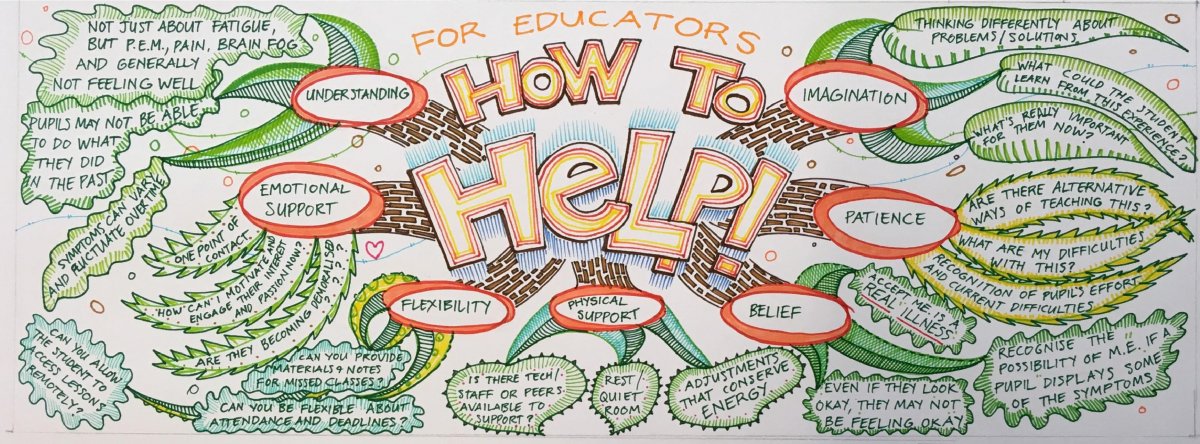How can I help?
As a teacher there are many ways that you can support a student who has M.E. For many young people with the condition, their education and ability to stay in school is significantly impacted. At points in their education, students with M.E. may need support in managing their condition and their health may need to be prioritised. There are a number of ways that you can support them through these periods by making adjustments; this may include a period of convalescence or part time attendance.
If you are
a teacher and want to know more about the condition and how you can help your
students, we have developed this page was created in collaboration with young people with M.E. and their parents.
“I would want my teacher to understand that I did truly want to learn and be at school, and that I would have loved more support from teachers. I found the smallest things a struggle and my concentration and memory are poor because of my M.E.”
Symptoms of M.E.
Post-exertional malaise is a hallmark symptom of M.E. It has been described as, “delayed and prolonged worsening of symptoms and loss of stamina after physical, cognitive or emotional activity leading to a reduction in functional ability."
There are a range of symptoms and it is important to know that people with M.E. may only experience a few of them and at varying levels of severity. Some more common examples are feeling generally unwell, unrefreshing sleep, chronic pain, sleep disturbance, headaches, problems with cognition, speech and language problems, poor temperature control, dizziness, hypersensitivity to light and sound, nausea and loss of appetite. You can read more about the symptoms of M.E. in young people.
This short 5 minute video by the pediatrician Dr. David Bell clearly and concisely describes the main symptoms of M.E.
How can you best support young people like me?
- Believe me. M.E. is a neurological condition that affects a number of systems in the body. It’s an invisible illness, I may be ill even if I don’t look ill.
- Allow me to rest. My M.E. means that I need to be allowed to rest and balance my time and activities. Many people with M.E. manage their condition through something called ‘pacing’, as M.E. fluctuates and varies in severity over time.
- Prioritise my health. The impact that M.E. has on my body means that my health needs must be prioritised over education and other activities. This doesn’t mean that I don’t want to participate in education, or that I’m lazy.
- Understand that school can make my condition worse. If I over exert myself at the beginning of my illness it makes it likely that I will be unwell for longer and maybe become more severely affected and that my health might not improve.
Resources
Our How can I help? pack offers practical adjustments that can be incorporated in to your students educational programme. This brief guide includes a mind map, case study and graphs that have all been produced in collaboration with people affected by M.E.
Zoe's first-hand experience shows the difference an understanding teacher made.
The functional ability scale is a tool to help you and your student work out where they are with their M.E. You can use it to help them understand and measure how much they can do. If their symptoms vary a lot, they may want to make a note of where you are on a good day, as well as where they are on a bad day.
These two films on paediatric M.E./CFS illustrate the difficulties in diagnosis and management. They accompany a primer (2017) for medical practitioners to work with young people with M.E.
This prize-winning animation explores the sensory difficulties that can accompany M.E. Many people find noise, light or smells severely affect their ability to function once they are living with M.E.



